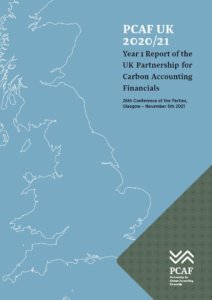Measuring What Matters

Alison Vipond, Sustainability Lead at Ecology, co-chairs the UK Residential Lending Working Group of PCAF UK to improve measurement of financed emissions from mortgaged properties.
Today the group produces its first report. Alison reflects on the positive progress the group has made, and some of Ecology’s future priorities.
Addressing climate change by reducing carbon emissions from our homes is central to Ecology’s mission.
Over the past year, I’ve had the pleasure of co-chairing the UK Residential Lending Working Group of Partnership for Carbon Accounting Financials UK (PCAF), a group of leading financial institutions in the UK working to improve the measurement of greenhouse gas emissions of loans and investments.
Greenhouse gas emissions must be more than halved in this decade and virtually eliminated by 2050. The journey to net zero starts with measurement and disclosure of emissions. For a financial institution, the majority of its emissions come from activities financed through their loans and investments (financed emissions). The financial sector, therefore, has a critical role to play in steering financial flows towards activities that decarbonise our economy.
Ecology’s carbon accounting journey
At Ecology Building Society, we’ve been reporting the annual carbon footprint of running our business since 2012. However, our largest footprint comes from fossil fuels used to heat and power properties in our mortgage portfolio. For some years, we have been using the ‘A to G’ energy efficiency rating from properties’ Energy Performance Certificates to gauge the energy efficiency of mortgage properties. At the end of 2020, we measured the annual operational emissions from fuel used to heat and power properties we lend on and were the first building society to disclose the carbon accounts for our mortgage lending. The experience of acquiring and examining the necessary data, especially dealing with gaps in data, gave us valuable insights that we were able to share and build upon when invited to co-chair the UK Residential Lending Working Group of PCAF UK, alongside Federated Hermes as the PCAF UK Chair.
PCAF UK – what we have learned in our first year
Following a year of collaboration, today PCAF UK publishes its first annual report, sharing the insights that member financial institutions have learned in measuring our financed emissions, focussing on practical data 
The PCAF Global Greenhouse Gas Accounting and Reporting Standard for the Financial Industry, sets out a standardised approach to prepare and disclose carbon accounts of financed emissions that are robust, transparent and comparable over time.
However, measuring financed emissions is not without its challenges. Using the Global Standard still relies on input data to quantify the annual operational emissions from each asset in the loan or investment portfolio. Access to accurate, up-to-date data is a challenge that we urgently need to solve to prepare accurate carbon accounts and use them to track our pathway to net zero in a meaningful way.
Data is a major focus of the PCAF UK Residential Lending Working Group.
At present, the best available data for a property’s carbon emissions from space heating, water heating and lighting, comes from the property’s Energy Performance Certificate (EPC). The EPC shows carbon emissions calculated using a model (Standard Assessment Procedure) based on property characteristics such as size, fabric and heating source. At present, only about half of residential properties in the UK have a valid EPC and there are a number of well-documented limitations with the carbon emission data in EPCs which are summarised in our PCAF UK first report.
PCAF UK Working Group members who have prepared their first set of carbon accounts shared their approaches to collating data and dealing with data gaps varying from sophisticated AI approaches to simple proxies.
Fortunately there is considerable research and innovation taking place to improve the data. The Working Group has also benefitted from knowledge share from experts, to explore new developments in data, which are summarised briefly in the report. These include improving the Standard Assessment Procedure model that underpins the EPC; use of sophisticated 3D building stock models to calculate EPCs where they are unavailable; automatic updates to EPCs to ensure energy-efficiency improvements are considered; and data from smart meters which automatically provide energy usage data.
Based on our practical insights of working with currently available data, and the innovations that are taking place, the Working Group has made a set of policy recommendations to improve data quality and availability.
A core message from PCAF UK is that, despite the current limitations in data, all financial institutions should embark on their carbon accounting journey, using the Global Standard and collaborate within the community.
Our priorities to improve the understanding of property emissions
At Ecology Building Society, we’ve learned a great deal from preparing our first set of carbon accounts and from working with PCAF UK. We have two areas that we intend to focus on to improve our understanding of the emissions from residential property – the building performance gap and embodied carbon.
- Research has shown that there can be a considerable ‘building performance’ gap between design aspirations and in-use performance, meaning that in practice, properties can demand much more energy to heat that would be suggested by the EPC certificate. Understanding and minimising this gap should be a priority to understand real-life emissions and how to reduce them.
- Embodied carbon is the carbon emissions associated with the materials and construction processes throughout the whole lifecycle of a building, including extraction, processing and manufacture, transport, assembly, maintenance, demolition and disposal. Embodied carbon can make up the majority of a building’s total emissions over its lifespan. The Global Standard for Greenhouse Gas Accounting refers to operational emissions from heating and powering buildings, but does not specify measurement of embodied carbon. Measuring and reducing embodied carbon should be a priority to reduce the overall impact of housing on climate change.
Final thoughts
Finally, financial institutions should not let the lack of perfect data stop us from preparing and disclosing our carbon accounts. As we work to make our carbon accounts more accurate and comprehensive, we must adopt an open, learning, collaborative mindset.



